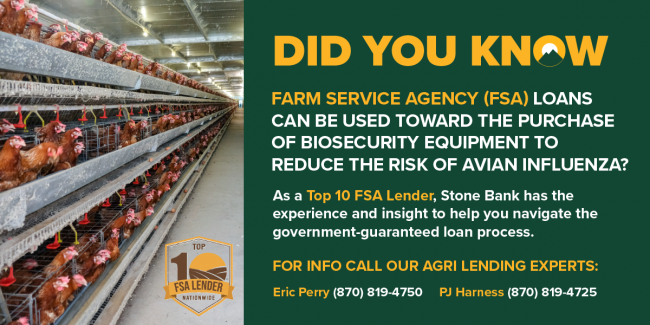As cases of the H5N1 avian influenza continue to spread across the U.S. – affecting 9 states as of early February 2025 – biosecurity measures have become a hot topic among poultry producers.
Biosecurity in commercial poultry farming is critical to preventing the introduction and spread of infectious diseases such as avian influenza (AI), Newcastle disease (ND), and infectious bronchitis (IB).
Most commercial farmers and their employees are familiar with Operational Biosecurity measures, the everyday practices and policies put in place to reduce contamination and minimize exposure to disease or bacteria.
Structural Biosecurity measures, on the other hand, focus on physical barriers such as facility design, and infrastructure that reduce disease transmission risks.
Viruses are known to mutate and evolve, which makes developing a thorough biosecurity plan more important than ever. Below are some key strategies and accompanying technologies to help keep your flock healthy and productive.
Note: Any technologies referenced are purely for educational purposes. Stone Bank does not endorse or promote any of the businesses listed.
Perimeter Biosecurity: Fencing & Restricted Entry
FENCING: High-quality perimeter fencing (e.g., chain-link, welded wire) prevents entry of wild birds, rodents, and unauthorized personnel.
GATE CONTROL & SECURITY: Controlled-access points with security guards, cameras, or biometric systems restrict unauthorized access.
BUFFER ZONES: A designated no-entry zone between farm areas and external roads limits pathogen introduction.
Technologies to Consider:
- Gallagher Security – Perimeter fencing, electronic gates, and biometric access control.
- IDEX Biosecurity Access Control – Employee entry tracking and access management systems.
Controlled Entry Points & Biosecure Entry Systems
DISINFECTION STATIONS: Footbaths, hand sanitizers, and disinfectant mats at all entry points reduce pathogen entry.
VEHICLE SPRAY SYSTEMS: Automated disinfection tunnels for vehicles entering the premises prevent disease spread.
SHOWER-IN/SHOWER-OUT SYSTEMS: Workers and visitors must change into farm-provided biosecure clothing before entering poultry zones.
Technologies to consider:
- Zagro Farm Hygiene Systems – Automatic vehicle disinfection tunnels and controlled access stations.
- Sanosil Q-Jet – Mist-based entry disinfection systems for employees entering poultry houses.
Air Filtration & Ventilation Systems
HIGH-EFFICIENCY PARTICULATE AIR (HEPA) FILTERS: Prevent airborne pathogens from entering poultry houses.
POSITIVE PRESSURE VENTILATION: Ensures that only clean, filtered air enters the barn while pushing out contaminated air.
UV LIGHT AIR STERILIZATION: Can be used in air intake systems to neutralize viruses and bacteria.
Technologies to consider:
- Munters Ventilation Systems – Positive pressure ventilation with HEPA filtration.
- Big Dutchman – Complete climate control systems, including automated airflow and air disinfection units.
- AgriAir UV Biosecurity Filters – UV-based air sterilization for poultry houses.
- BioOx® Air Cleaning Systems – Removes airborne pathogens from poultry barns.
Water Treatment & Sanitation
CHLORINATION AND FILTRATION SYSTEMS: Ensure water used for poultry drinking and cooling is free from bacteria, viruses, and biofilms.
UV WATER PURIFICATION: An additional safeguard to destroy waterborne pathogens.
- Dosatron Water Treatment Systems – Chlorination, acidification, and organic sanitizers for poultry drinking water.
- Hydro Systems AquaBlend – Water sanitation systems that automatically mix disinfectants.
- Pentair & Trojan UV Water Systems – Industrial-grade UV-based water disinfection for poultry facilities.
Waste Management & Composting Systems
CLOSED WASTE DISPOSAL UNITS: Prevent disease transmission from carcasses and manure.
COMPOSTING FACILITIES: Properly designed composting sites for dead birds and waste help break down pathogens effectively.
INCINERATION UNITS: Some commercial farms use on-site incinerators for immediate and biosecure disposal of infected birds.
Technologies to consider:
- Kuhn Agri-Environmental Composting Systems – High-efficiency poultry manure and carcass composters.
- Inciner8 – Poultry on-farm incinerators for biosecure carcass disposal.
- Valco Agri-Livestock Drying Systems – High-temperature incineration unit.
Surveillance & Monitoring Systems
CCTV & AI SURVEILLANCE: Monitors farm operations for unauthorized access and hygiene compliance.
AUTOMATED ENVIRONMENTAL SENSORS: Monitor temperature, humidity, ammonia levels, and air quality to prevent disease outbreaks.
Technologies to consider:
- Hikvision AI Security Cameras – Thermal cameras for detecting farm intrusions and monitoring biosecurity compliance.
- Evonik Porphyrio® – AI-based poultry health monitoring software.
- FarmLab IoT Sensors – Environmental monitoring for temperature, ammonia levels, and humidity.
- Allflex Biometric Animal Identification – RFID-based animal tracking and traceability.
Emergency Response & Quarantine Zones
ISOLATION HOUSES: Quarantine new or sick birds in separate facilities before introducing them into main flocks.
EMERGENCY CULLING EQUIPMENT: Culling tools like CO₂ chambers or foam depopulation systems minimize disease spread.
Technologies to consider:
- Euthanex Poultry Culling Systems – Humane CO₂ and foam-based culling solutions.
- PAS Reform Hatchery Biocontainment – Quarantine-ready biosecure hatchery units.
- Elanco Emergency AI Disinfectant Kit – Avian influenza outbreak disinfection and containment tools.
- Plas Labs Poultry Isolators – Prefabricated poultry isolation and decontamination units.
To achieve effective biosecurity, commercial poultry farms should integrate multiple layers of protection using high-quality, proven technologies. Investing in automated biosecurity solutions can significantly reduce the risk of disease outbreaks and financial losses.
Whether you want to purchase more land to expand your operations or invest in technology to protect the long-term health of your flock (and business), an FSA loan may be the perfect solution.
To learn more about our FSA Lending program or to speak to Agri-Lender, please call PJ Harness at 870-819-4725 , Eric Perry at 870-819-4750, or email us at FSALending@stonebank.com
Additional Resources available via the USDA’s Defend the Flock.
Loans subject to credit approval and other program requirements. Other terms and conditions may apply. Call (833) 253-2265.

